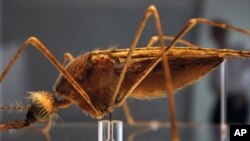Researchers have discovered a bacterium in the gut of the Anopheles mosquito which may someday be used to destroy and, therefore, prevent the spread of the disease-causing parasite.
The World Health Organization estimates 800,000 people die of malaria each year. The parasite that causes the disease is transmitted by the Anopheles mosquito. After the mosquito feeds on the blood of an infected individual, the parasite matures into an infectious stage in the insect’s gut. From there, the parasite, known as Plasmodium falciparum, takes up residence in the mosquito’s salivary glands so it can infect the next person that’s bitten.
Researchers at Johns Hopkins School of Public Health in Baltimore, Maryland found the bacterium in the gut of the Anopheles mosquito among hundreds of so-called microbial flora that live harmlessly in the stomach of a group of Anopheles mosquitoes collected in an area of southern Zambia where malaria is rampant.
The microbe, which was in the guts of a small percentage of the mosquitoes, protected those insects against infection with the parasite.
Lead researcher George Dimopoulos says the protection seems to be a side-effect of the bacterium’s normal bodily function, adding that scientists would like to figure out a way to use the microbe as a weapon against malaria.
“Our study has shown that this bacterium produces free radicals, molecules that contain oxygen and that can cause damage to cells. So, we believe that’s how this bacterium is killing the malaria parasite in the mosquito gut. But we need to understand that mechanism in greater detail.”
To demonstrate the beneficial effect, the researchers used antibiotics to kill the bacterium in mosquitoes that contained it, and were then able to infect those mosquitoes more easily with the Plasmodium parasite.
They also introduced the bacterium into the guts of mosquitoes that didn’t have it. When they fed this group infected blood, the parasite was destroyed in nearly all of the insects.
Dimopoulos says researchers’ goal now is to figure out a way to introduce the microbe into large populations of Anopheles mosquitoes - perhaps through bait laced with their favorite snack.
“Mosquitoes need to feed on sugar every day. And one can potentially expose mosquitoes in the field to these bacteria through sugar bait.”
The researchers noted that mosquitoes with the bacterium in their guts die sooner than those without it - when both groups are infected with the parasite. Since the malaria parasite lives in mosquitoes for about two weeks before maturing to an infectious stage, Dimopoulos says it’s good news that the stomach bacterium seems to shorten the insect’s lifespan, before it could potentially transmit the parasite to humans.












